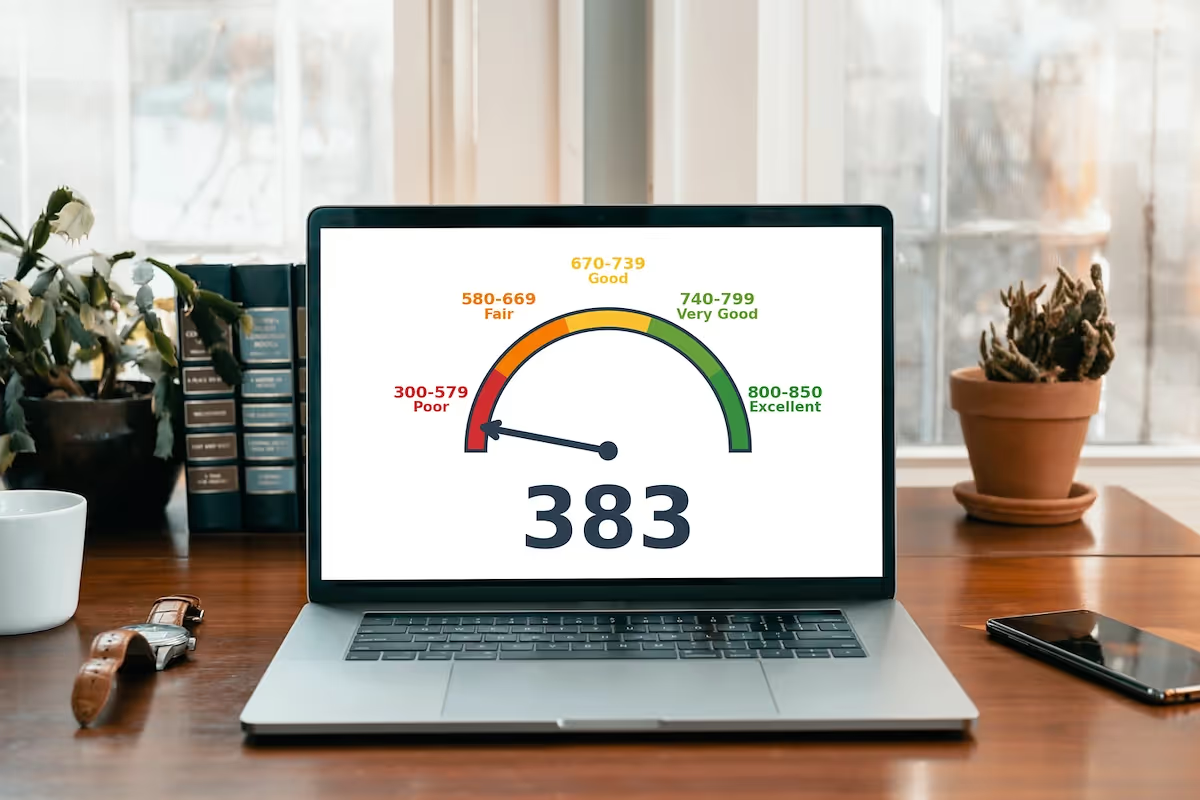
Kudos has partnered with CardRatings and Red Ventures for our coverage of credit card products. Kudos, CardRatings, and Red Ventures may receive a commission from card issuers. Kudos may receive commission from card issuers. Some of the card offers that appear on Kudos are from advertisers and may impact how and where card products appear on the site. Kudos tries to include as many card companies and offers as we are aware of, including offers from issuers that don't pay us, but we may not cover all card companies or all available card offers. You don't have to use our links, but we're grateful when you do!
383 Credit score: What You Need to Know in 2025
July 1, 2025


TL;DR
A 383 credit score provides a foundational starting point for building a stronger financial profile. This score falls into the "Poor" FICO category, highlighting a clear path and significant opportunities for improvement.
What Does a 383 Credit Score Mean?
A credit score of 383 is considered 'very poor' on the FICO Score scale, which ranges from 300 to 850. This places it at the lowest end of the credit spectrum, indicating to potential lenders a history of significant financial challenges. Lenders view this score as a sign of very high risk, making them hesitant to extend credit of any kind.
This score will severely impact your financial life. Obtaining new loans, credit cards, or a mortgage will be exceptionally difficult. Any credit you are approved for will likely have very high interest rates and strict terms. While this presents considerable obstacles, understanding your score's standing is the first step toward improving your financial future.
Who Has a 383 Credit Score?
While a 383 credit score is far below average, it's useful to see how scores typically trend. Data on average credit scores from 2023 shows a clear pattern of scores improving with age:
- Generation Z (ages 18-26): 680
- Millennials (ages 27-42): 690
- Generation X (ages 43-58): 709
- Baby Boomers (ages 59-77): 745
- Silent Generation (ages 78+): 760
Credit Cards With a 383 Credit Score
A credit score of 383 is considered very poor, placing you in the highest-risk category for most lenders. Consequently, obtaining a traditional unsecured credit card will be extremely challenging, as most issuers will likely deny your application outright. If you are approved for any card, it will almost certainly be a secured credit card, which requires a cash deposit and often comes with high fees and interest rates.
Kudos can help by using its AI-powered tools to analyze your financial habits and match you with suitable options from a database of nearly 3,000 cards. The Dream Wallet feature provides insights into how a new card might affect your credit score, guiding you toward options designed to build credit responsibly.
Auto Loans and a 383 Credit Score
A 383 credit score places you in the deep subprime category, which can make securing an auto loan challenging. Lenders view this score as high-risk, often resulting in significantly higher interest rates if you are approved.
- Super-prime (781-850): 5.25% for new cars, 7.13% for used cars
- Prime (661-780): 6.87% for new cars, 9.36% for used cars
- Non-prime (601-660): 9.83% for new cars, 13.92% for used cars
- Subprime (501-600): 13.18% for new cars, 18.86% for used cars
- Deep subprime (300-500): 15.77% for new cars, 21.55% for used cars, based on 2025 market analysis.
Mortgages at a 383 Credit Score
A 383 credit score is considered very low, making it extremely difficult to qualify for a mortgage. Mainstream lenders will almost universally deny applicants with scores this low. For context, even government-backed FHA loans, known for their flexibility, require a minimum score of 500 with a 10% down payment. Your score falls significantly below the minimum requirements for nearly all conventional and government-backed loan programs.
In the rare event you find a specialty or non-prime lender, the loan terms will be costly. Expect to face much higher interest rates, a large down payment requirement, and additional fees. Your borrowing options will be severely restricted, and lenders will conduct a rigorous review of your financial history before considering an approval.
What's in a Credit Score?
Figuring out what goes into your credit score can feel like trying to solve a complex puzzle, but it generally boils down to a handful of key elements. The most common factors include:
- Your payment history, which tracks whether you pay your bills on time, is the most significant factor.
- Credit utilization, or the amount of credit you're using compared to your total available credit, also plays a major role.
- The length of your credit history demonstrates your experience with managing credit over time.
- Having a healthy mix of different types of credit, such as credit cards and installment loans, can positively impact your score.
- Finally, recent credit inquiries, which occur when you apply for new credit, are also taken into account.
How to Improve Your 383 Credit Score
Improving your credit score takes time and consistent effort, but it is entirely possible to rebuild your financial standing by focusing on a few key areas. According to an expert guide on the topic, here are four actions you can take to start improving your score:
- Monitor your credit reports. Regularly check your reports for inaccuracies or signs of identity theft that could be dragging your score down. Disputing and removing errors is one of the fastest ways to see a positive change.
- Establish automatic bill payments. Your payment history is the most significant factor in your score, so ensuring every bill is paid on time is critical. Building a consistent record of on-time payments is the foundation for moving your score out of the poor range.
- Reduce your credit utilization ratio. Aim to use less than 30% of your available credit, as this shows lenders you are not over-reliant on debt. For a score in the 300s, paying down balances can have a powerful and immediate positive impact.
- Consider a secured credit card. A 383 score makes it difficult to qualify for traditional credit, but a secured card allows you to build a positive payment history. Responsible use is reported to the credit bureaus, demonstrating you can manage credit effectively over time.
For personalized help managing your cards and monitoring your score as you rebuild, consider using a financial companion like Kudos.
Unlock your extra benefits when you become a Kudos member

Turn your online shopping into even more rewards

Join over 400,000 members simplifying their finances

Editorial Disclosure: Opinions expressed here are those of Kudos alone, not those of any bank, credit card issuer, hotel, airline, or other entity. This content has not been reviewed, approved or otherwise endorsed by any of the entities included within the post.



































.webp)


.webp)

.webp)



